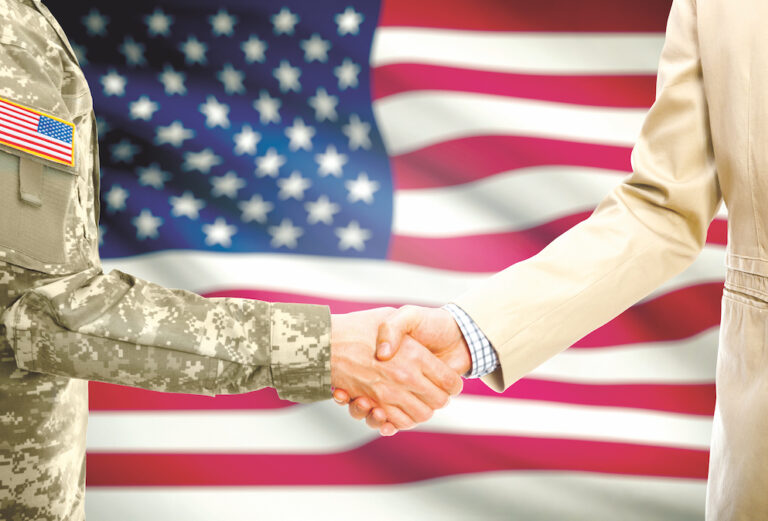Since the Class B Standardized Military Truck, also known as the “Liberty Truck,” debuted at the start of World War I, skilled operators have been needed for military operations. As trucks improved during and after the war, they became vehicles society relied on for the rapid advent of new technologies and transportation systems.
In fact, at the time, the military offered some of the best training available for operators of heavy vehicles.
It’s likely no surprise that, as the war came to an end and soldiers returned home to their families and civilian life, many veterans found employment as drivers, navigating delivery trucks through city streets and along the nation’s highways.
Today, the various branches of the U.S. military operate more than 170,000 non-combat trucks in dozens of models. Each of these trucks has one thing in common: There is a skilled driver behind the wheel. It is for this reason that many commercial motor carriers so highly prize drivers who have served in the military.
When reviewing applications from military veterans, carrier recruiters should consider the valuable skills, characteristics and personality traits that are typical of service members and carefully evaluate each candidate. At the same time, it is also important that human resources professionals set aside any preconceived stereotypes surrounding the term “veteran.”
The fact is, despite veterans’ service to their country, it is commonly believed that most carry “baggage” because of their experiences, especially those who have seen active combat. However, the truth is that every potential driver, whether civilian or military, has challenges and issues to overcome. Post-traumatic stress disorder (PTSD) is not limited to soldiers and law enforcement officers.
See beyond the surface.
It’s the HR professional’s job to see through those challenges and find the quality employee within.
Earlier this year, the Truckload Carriers Association (TCA) presented a webinar on the topic, “The Veteran Among Us.” In the webinar, panelists discussed the challenges and opportunities veterans have when leaving the military and finding jobs in the civilian sector.
One staggering statistic noted is that, upon discharge, 86% of those leaving the military service do not know what they want to do career-wise. That’s a huge pool of talent just waiting to be guided along the best path.
When employers learn the intangible and transferable skills the typical veteran possesses, they often realize those qualities make former service members ideal job candidates for motor carriers and other transportation-oriented businesses.
In the end, it is up to trucking industry recruiters to recognize those skills and help transitioning soldiers embark on successful careers.
Change is never easy.
This is a truth for the workforce in general, but it can be especially true when recruiting veterans. Many veterans emerge from the military with unique challenges. Some walk out the gate into civilian life with no home to go to. Some face daunting financial issues. And some are dealing with substance abuse.
Whether a former service member is struggling with such challenges or not, an employer can play an important role in helping a veteran conquer what can be a difficult transition to a civilian career.
One of the best ways to take advantage of a veteran’s unique skillset is by placing them in a recruiting role, working to help other service members step into a successful career. Veterans know veterans best, and they know what motivates them.
One in four veterans is currently employed in the transportation and logistics industry.
Why do former military personnel often find trucking so appealing? First, the industry is an excellent example of civilian employers taking advantage of transferable skills.
Just as the periods following World Wars I and II were marked by a stream of motor pool operators entering civilian life, the same holds true with the military today. Intangible, transferable, skills possessed in abundance by veterans are just waiting to be retargeted in the trucking industry.
It’s up to HR leaders to be prepared — to have programs already in place that attract veterans and to offer attractive benefits.
Look for transferable skills.
The transferable skills possessed by former service members are varied, and they are attractive to employers in all sectors.
First, consider the intangibles. Veterans typically possess empathy and critical thinking skills, and they are adept at decision making, even under pressure. When it comes to work ethic, teamwork, leadership, mental toughness and ability to adapt to various situations, it’s can be hard to find job candidates as well-qualified as veterans. In fact, studies show that more than 75% of veterans exhibit each of these traits upon exiting the military.
One of the issues facing recruiters when reviewing veteran’s resumes is the way the skills are listed and how they transfer to the civilian job description. Typically, recruiters find that veteran’s resumes focus on teamwork, how they fit into a team environment, their role within a team, and their importance to team success. What veterans don’t realize is that in the civilian workforce, while being able to work within a team is important, it is not the same as the military. Recruiters are looking at resumes of specific candidates who will fill specific roles. They want to know the candidates on an individual level. It is important that veterans realize the employer is interested in the skills that represent the individual.
Look at the individual.
Viewing a veteran as an individual rather than a stereotype is especially important in the transportation sector.
Consider truck drivers. They most often work alone, sometimes in the overnight hours when the world around them is asleep. It can be a lonely career.
It is important that motor carriers implement ways to interact with truck drivers aside from just seeing them in the office once a week. They must monitor the mental health of all employees who are living and working alone — whether they are military veterans or lifelong civilians.
Leading companies implement mental health services into their HR departments. This has been especially important since the COVID-19 pandemic, and employers have heeded the call. Coming out of the pandemic, only 30% to 40% of companies in any sector offered mental health services. Today that number has increased to 90%, a testament to the ability of corporate America to react to changing times and worker needs.
Create a set of best practices.
The overriding need in the transportation industry is a set of best practices for recruiting military veterans. Such practices should include guidelines and expectations, personal and professional development opportunities, and mentoring programs (preferably with a veteran-veteran relationship).
The Federal Motor Carrier Safety Administration (FMCSA) recognizes the value of bringing skilled veterans into the trucking industry. To help streamline the transition from the military to trucking, FMCSA is implementing programs allowing veterans to skip the written and/or skills tests to earn a CDL — provided a set of specific requirements is met. Likewise, the agency continues to experiment with allowing veterans under age 21 to drive interstate routes.
Ultimately, the success or failure of a carrier’s veteran recruitment effort is based on support from company leadership. When CEOs prioritize recruiting and retaining military veterans, they hire HR employees with dedication and determination to implement veteran recruitment programs.
Working together, the industry can pave the way for a new wave of veterans to drive a new breed of “Liberty Truck” across North America.
Since retiring from a career as an outdoor recreation professional from the State of Arkansas, Kris Rutherford has worked as a freelance writer and, with his wife, owns and publishes a small Northeast Texas newspaper, The Roxton Progress. Kris has worked as a ghostwriter and editor and has authored seven books of his own. He became interested in the trucking industry as a child in the 1970s when his family traveled the interstates twice a year between their home in Maine and their native Texas. He has been a classic country music enthusiast since the age of nine when he developed a special interest in trucking songs.








